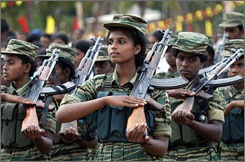 Sri Lankan troops on Sunday dealt the Tamil Tiger separatists a third major blow this month, seizing the last big town held by the rebels, Mullaittivu.
Sri Lankan troops on Sunday dealt the Tamil Tiger separatists a third major blow this month, seizing the last big town held by the rebels, Mullaittivu.
The army’s commander, Lieutenant-General Sarath Fonseka, said soldiers were close to finishing one of Asia’s longest-running insurgencies. Few would disagree now that he has the Liberation Tigers of Tamil Eelam (LTTE) trapped in a tiny wedge of jungle.
Here are some scenarios of what could happen next:
FONSEKA’S MARCH TO THE SEA:
This month alone, soldiers have run the Tigers out of their self-proclaimed capital Kilinochchi, the Jaffna Peninsula and now the port of Mullaittivu, a major LTTE operations base.
When hostilities were reignited in August 2006, the rebels held 15,000 square km (5,792 sq miles). Now, Fonseka says they have only 300 square km (186 square miles) of jungle and a diminishing stretch of the northeastern coast.
Fonseka is forcing the LTTE forces towards the sea, unless his troops seal off the coast and surround them.
Since the Tigers wear vials of cyanide around their necks in case of capture, surrender seems unlikely.
ARE THE TIGERS NOW TOOTHLESS?
Many analysts say the rebels are down to about 2,000 capable fighters and have little future as a conventional force.
The military is now much better equipped and trained than in the past, has President Mahinda Rajapaksa’s full backing and experienced, confident leadership in the form of his brother, Defence Secretary Gotabaya Rajapaksa, and Fonseka.
The LTTE still can carry out suicide bombings in the capital Colombo, and is blamed for one Just after Kilinochchi fell.
Fonseka has said he expects the hardest-core Tigers to go underground and conduct hit-and-run attacks once the war nears its end. He also said the army was ready to counter that.
WHAT ABOUT CIVILIANS IN THE WAR ZONE?
Aid agencies estimate there are about 230,000 Tamil refugees in the shrinking war zone. A government official who was in Mullaittivu said at least 100 were killed in artillery exchanges last week.
Rights groups and the government accuse the Tigers of forcibly conscripting people as fighters or labourers and of keeping them trapped in the war zone. The LTTE denies that.
The army last week set up a safe zone and urged people to go there; they say the rebels responded by placing artillery and heavy weapons inside it to foil civilian movement.
IS INDIA GOING TO INTERVENE?
No. Despite protests from Tamil politicians in India, Indian Prime Minister Manmohan Singh has made it clear he has no plans to stop Rajapaksa’s war against a group his country lists as a terrorist organisation.
He and Rajapaksa have agreed that the grievances of the Tamil people must be dealt with politically, a view shared and urged by much of the West. Rajapaksa plans to call elections to meet that end but critics say more will be needed.
DOES MILITARY SUCCESS MEAN EARLY ELECTIONS?
Rajapaksa is riding high on the war. Signs of early polls abound: the election budget this year has been quadrupled, elections are due in two provinces in February and the main opposition United National Party (UNP) has assumed a campaign stance.
Allies say there are plenty of factors that will influence Rajapaksa’s decision on timing. He is aware that the UNP’s main criticism is the state of the $32 billion (23.5 billion pound) economy.
AND WHAT ABOUT THE ECONOMY?
As predicted, both the Colombo Stock Exchange and the sliding rupee currency got a boost from Kilinochchi’s capture. Both swiftly went back to moving on their own fundamentals as they have throughout the quarter-century war.
Sri Lanka is suffering from expensive short-term foreign debt, declining foreign exchange reserves and a high deficit. Key exports such as tea and clothing have also been hit by the global slowdown and the war is expected to cost nearly $2 billion this year.
IS ANY OF THAT A RISK TO RAJAPAKSA?
(For updates you can share with your friends, follow TNN on Facebook and Twitter )
